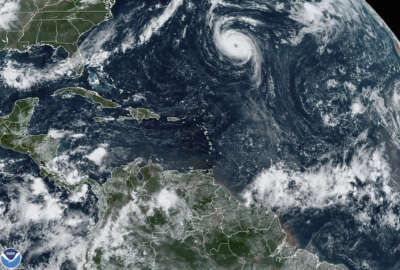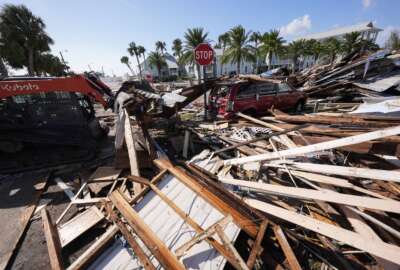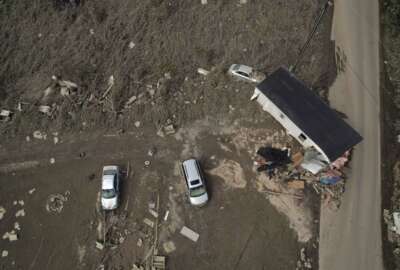Over 6,700 Guard troops deployed to assist with Helene response
"It's a one in a thousand year storm. This is going to be a long recovery process," said Army Maj. Gen. Win Burkett.
More than 6,700 Army and Air National Guard members from 16 states have been deployed to the southeastern United States to support search and rescue and recovery operations in communities impacted by Hurricane Helene, one of the deadliest storms in recent history.
Defense Secretary Lloyd Austin has also authorized the deployment of up to 1,000 active-duty troops to assist the Federal Emergency Management Agency and the Guard with recovery efforts.
As governors continue to assess and determine the needs on the ground, the number of National Guard personnel deployed to impacted areas will most likely increase over the coming weeks, said Army Maj. Gen. Win Burkett, National Guard Bureau director of operations.
“I would anticipate the number to go up until it doesn’t,” Burkett told reporters Thursday. If the states determine that they need more capability or they need to start replacing some of the formations that they have, then we’re going to provide that, and we’re going to continuously look for solutions that would enable that as quickly as possible.”
“I don’t want to jinx anything, but there’s another system that’s making its way into the Gulf, and it’s not completely formed. Even if it doesn’t form, if it turns into a rain event, it could exacerbate the recovery operations and it could have some negative impacts. We will continue until the governors tell us all of our civilian partners have matters on hand.”
Army Col. Paul Hollenack, the North Carolina National Guard’s 30th Armored Brigade Combat Team commander, said they are still developing requirements as FEMA personnel and Guard members continue to search for survivors, distribute supplies and clear debris as communities remain cut off by washed-away roads.
“I’m not sure if we’re at peak yet,” said Hollenack. “I think in another week or so, though, we’ll be looking at rotating people out, both for their own self-care, as well as being very conscious of the civilian employers that we’re impacting.”
About 1,100 Guard members have been deployed to support rescue and recovery efforts in North Carolina — so far, Guardsmen have delivered nearly one million pounds of supplies, including food and water, with 600,000 pounds transported by air to hard-to-reach areas. Approximately 500 people and 150 pets have been rescued through search operations.
Hollenack said clearing road obstacles and restoring access to areas that have been cut off is one of the major efforts for Guard members in western North Carolina — it is still unclear when residents will be able to access the area.
Meanwhile, South Carolina has deployed over 1,000 National Guard personnel from the Army, Air and State National Guard components — about 35 people have been rescued by the Guard members.
South Carolina Guard personnel have also been racing to clear debris, especially downed trees, to ensure power companies can restore electricity.
About a million people from Florida to Virginia still have no power, according to Poweroutage.us.
In Tennessee, 300 National Guard personnel are operating across six counties, with a focus on debris clearing and reopening critical infrastructure. The Guard is operating 12 supply distribution points to deliver food and water to impacted communities.
“We are here till the mission is done. However long that takes — we’re a week into it. I don’t think we’ve made any significant assessment of how long for now, but we’re a lot tied into emergency management. They track their lifelines as far as when services are restored and we can get back to some semblance of normalcy,” said Hollenack.
Burkett said Hurricane Helene is a “one in 1000 year storm” and that recovery for the region will be lengthy and challenging.
“It’s very difficult to think that you’re completely prepared. All eyes right now are on North Carolina and Tennessee. That’s not to negate any of the great efforts in the other states, but this is going to be a long recovery process.”
Copyright © 2024 Federal News Network. All rights reserved. This website is not intended for users located within the European Economic Area.







